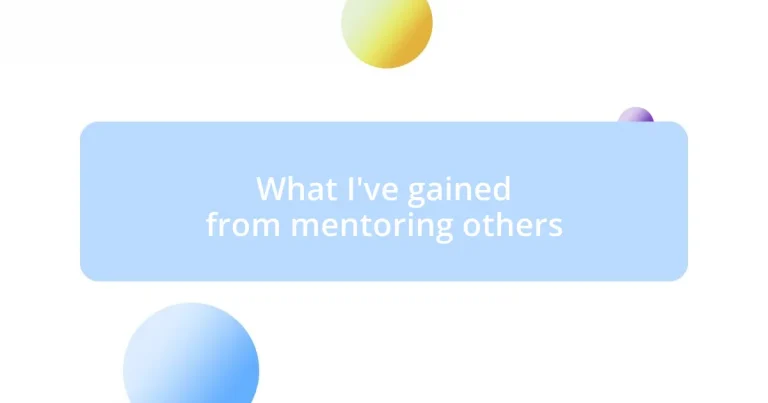Key takeaways:
- Mentoring fosters personal growth for both the mentor and mentee, enhancing empathy and self-reflection.
- Key skills acquired through mentoring include active listening, adaptability, and emotional intelligence.
- Building strong relationships within mentoring can lead to lasting connections and mutual learning experiences.
- The feedback loop between mentor and mentee is crucial for measuring the effectiveness and emotional impact of mentoring sessions.
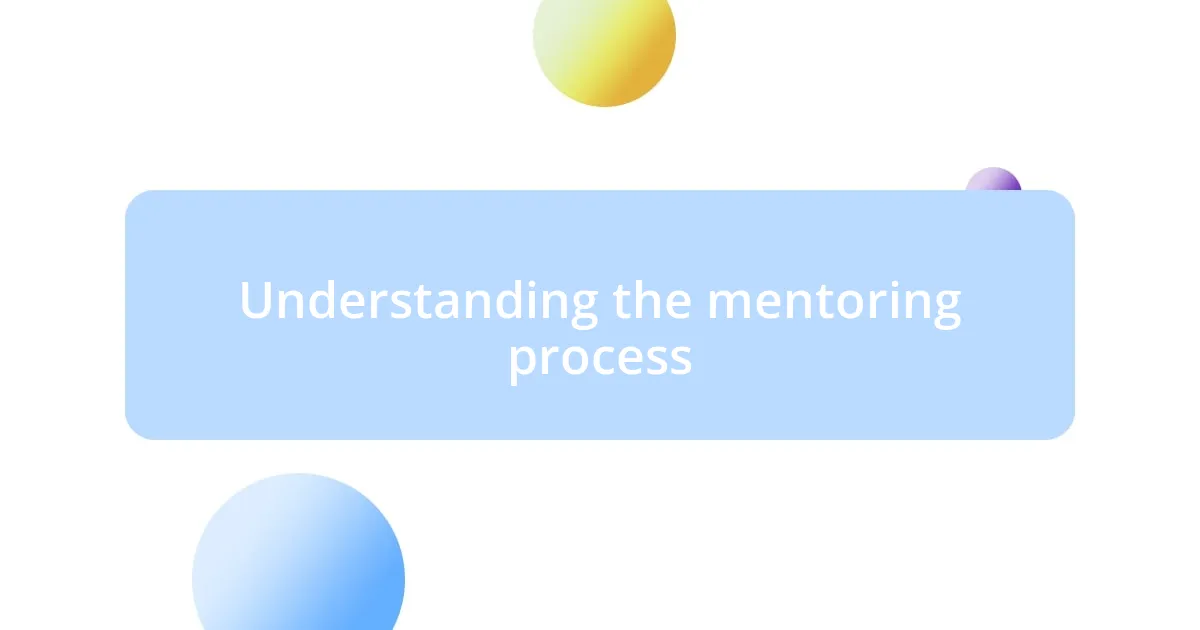
Understanding the mentoring process
Understanding the mentoring process is like discovering a hidden treasure. I remember my first experience as a mentor; I was nervous but excited to share my knowledge. It was enlightening to see how my guidance helped someone gain confidence and new skills.
I often reflect on those moments when my mentee would ask questions that pushed me to think deeper. Have you ever felt that surge of joy when someone you’ve mentored finally grasps a challenging concept? It’s a rewarding experience that reaffirms the value of patience and persistence in the mentoring journey.
The dynamics of mentoring involve not only sharing knowledge but also building a connection. I’ve found that establishing trust is crucial; it creates an environment where both mentor and mentee can flourish. When I shared my own struggles, it opened doors for honest conversations that led to profound growth for both of us.
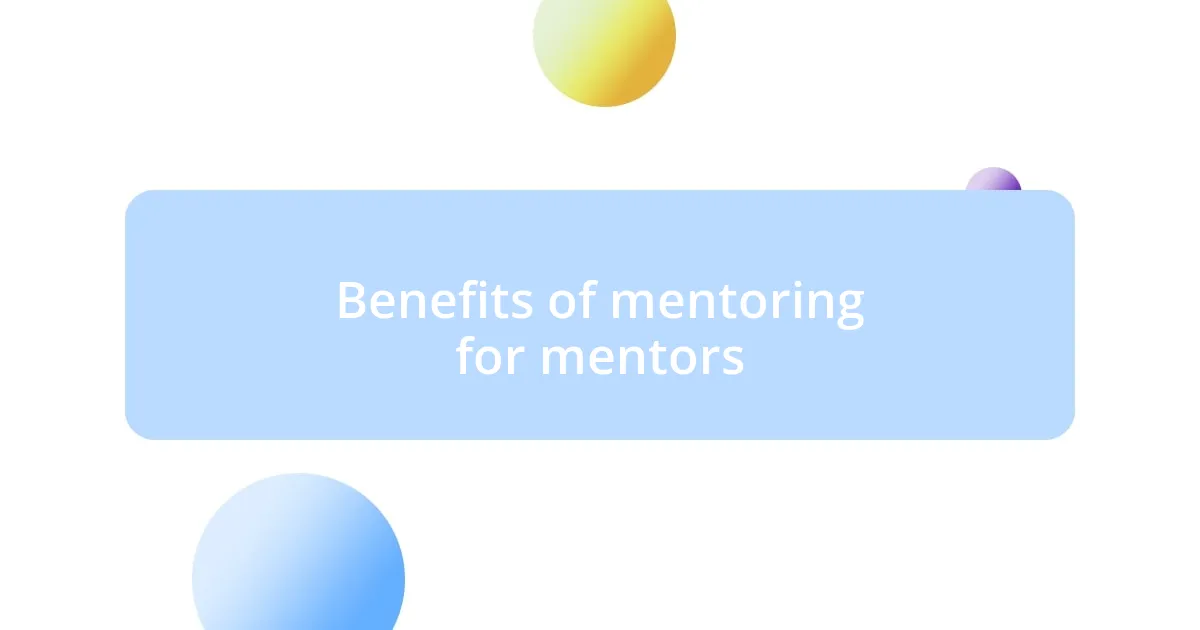
Benefits of mentoring for mentors
Mentoring others has brought unexpected benefits to my own personal growth. For instance, I remember a particular session where my mentee opened up about their struggles. As I listened, I realized that these conversations had a way of reinforcing my own values and reinforcing my own experiences. It was a moment of shared humanity that made me reflect on my journey, ultimately making me more empathetic.
On a practical level, being a mentor also sharpens my own skills. I often find myself preparing for our meetings, which encourages me to stay updated with industry trends and best practices. You know, when you explain complex concepts to someone else, it forces you to understand them at a deeper level. The process is immensely satisfying and acts as a learning loop — the more I teach, the more I learn.
Lastly, the relationships I build with mentees extend beyond the immediate mentorship, often blossoming into invaluable connections. I fondly recall one mentee who later collaborated with me on a project. Our mutual support has not only strengthened my professional network but has also enriched my life in countless ways. I can genuinely say that mentoring has made me both a better professional and a more considerate human being.
| Benefit | Description |
|---|---|
| Personal Growth | Sharing experiences fosters empathy and prompts self-reflection. |
| Skill Enhancement | Preparing for mentoring sessions sharpens knowledge and skills. |
| Networking Opportunities | Mentoring relationships can lead to valuable professional connections. |
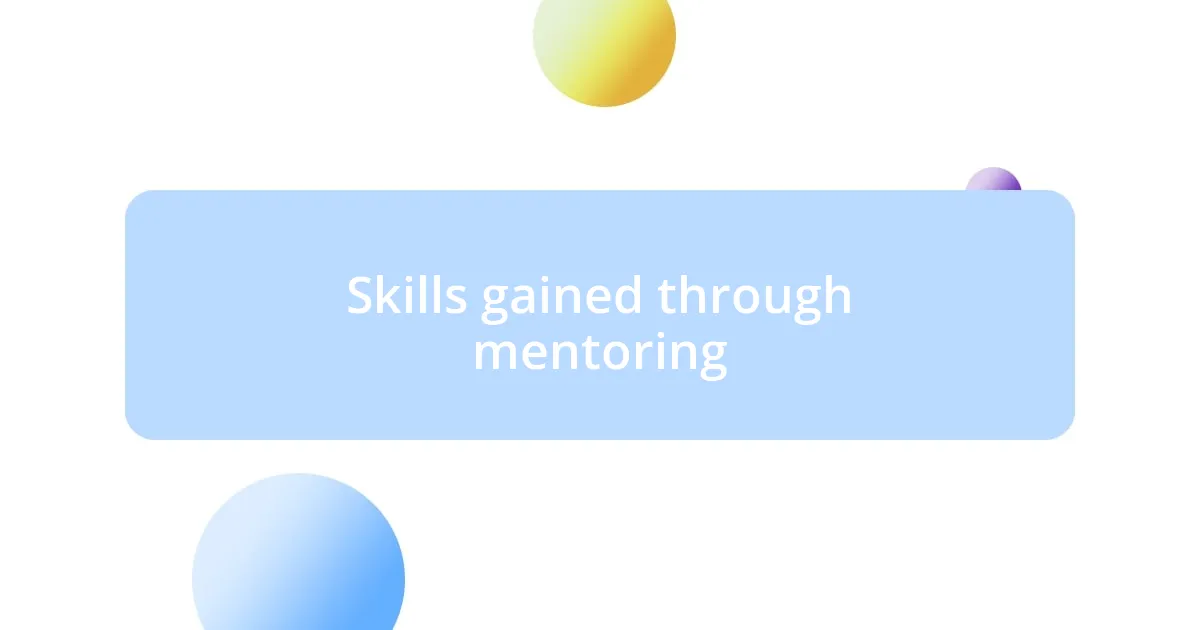
Skills gained through mentoring
When I mentor others, I find that not only do I help them grow, but I also develop important skills in the process. I remember a specific situation where I had to guide a mentee through a particularly tough project. It pushed me to improve my communication skills, ensuring that I broke down complex ideas into manageable parts. That experience taught me that clear communication is paramount—not just for teaching, but for fostering understanding and trust.
Here are some key skills I’ve gained through mentoring:
- Active Listening: Engaging deeply with my mentee’s concerns has improved my ability to listen and respond with empathy.
- Adaptability: Each mentee brings unique challenges; adjusting my mentoring style has made me more flexible in various situations.
- Leadership: As a mentor, I’ve stepped up as a leader, which has honed my decision-making skills and my capacity to motivate others.
- Conflict Resolution: Navigating disagreements and different perspectives with my mentees has sharpened my negotiation skills.
- Emotional Intelligence: Understanding and managing my emotions, as well as those of my mentees, has deepened my relationships both personally and professionally.
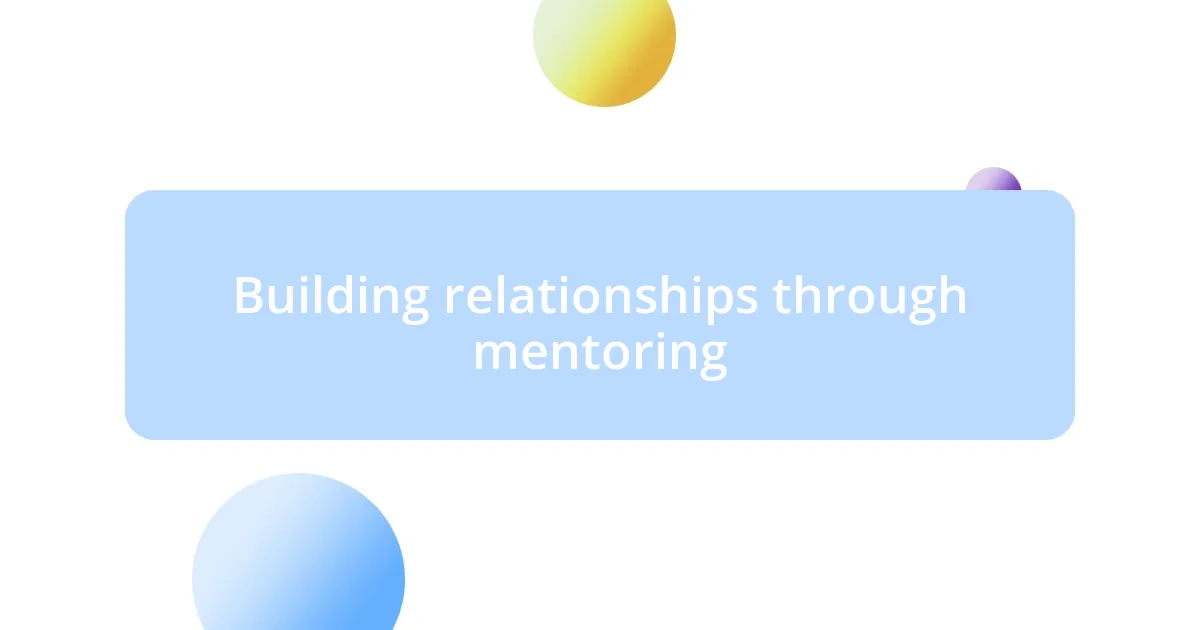
Building relationships through mentoring
When you dive into mentoring, you quickly learn that it’s not just about imparting knowledge; it’s about forging strong, meaningful relationships. I recall meeting one mentee who initially seemed reserved, but as our sessions progressed, we uncovered shared interests and values. That connection not only enriched our conversations but turned the mentoring experience into something genuinely collaborative. Wouldn’t you agree that these types of bonds can lead to profound insights?
The beauty of mentoring often lies in the unexpected friendships that form. For instance, I remember celebrating a small milestone with a mentee who had landed their first meaningful role. The joy in their voice as they thanked me moved me profoundly, reminding me that our journey was not just professional but deeply personal. It always strikes me how mentoring allows you to witness growth in a way that creates lasting relationships—ones you might not have anticipated at the beginning.
Moreover, as I think about these relationships, I’m aware that they are symbiotic. My mentees have shared their fresh perspectives on industry trends that I hadn’t considered before. This exchange fosters a sense of community and highlights how mentoring can be a two-way street. Have you ever felt that spark when learning from those you’re supposed to guide? It’s a testament to the depth of connection that mentoring can cultivate.
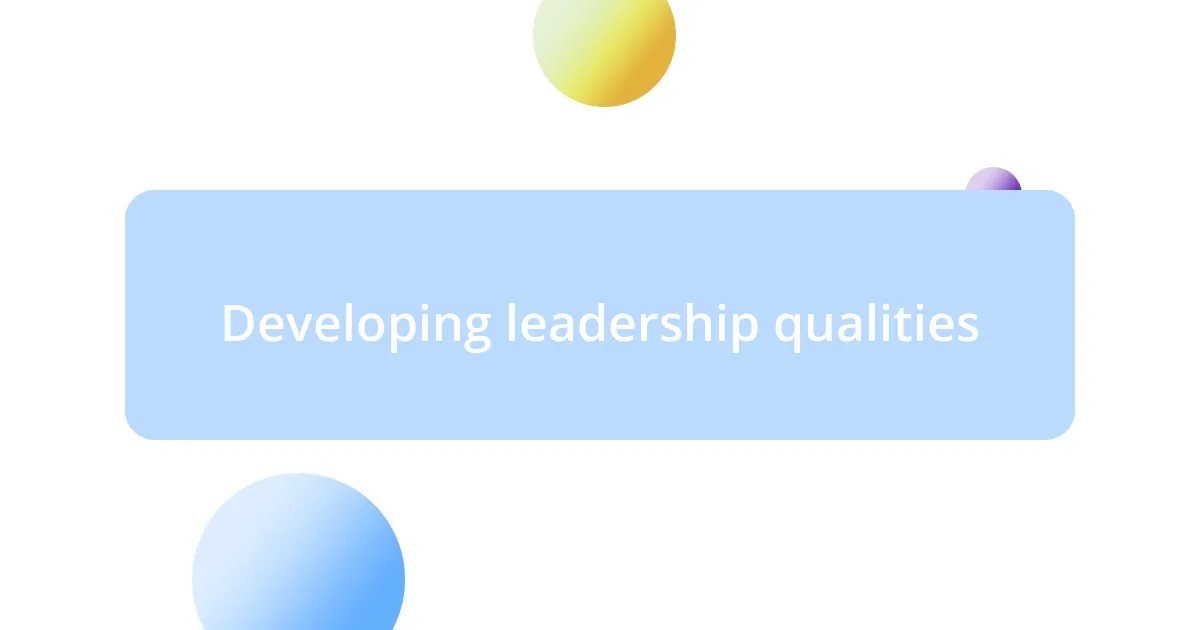
Developing leadership qualities
The journey of mentoring beautifully intertwines with developing leadership qualities. I remember an instance where a mentee faced a significant challenge during a pitch presentation. Instead of simply telling them what to do, I found myself guiding them through the process, which required me to embody confidence and assertiveness. In that moment, I realized that true leadership isn’t just about making decisions; it’s also about empowering others to find their own voice and solutions.
I’ve discovered that leading by example is not just a saying; it’s a fundamental aspect of mentoring. For instance, when I embraced vulnerability about my own failures in my early career, it sparked a deeper connection with my mentees. They shared their fears, knowing that I’d faced similar obstacles. This transparency nurtured an environment where we could learn from setbacks—a powerful lesson in leadership that transformed our sessions into collaborative learning experiences.
Additionally, nurturing my mentees’ growth has heightened my self-awareness as a leader. I vividly recall a time when I misjudged a mentee’s readiness for a project. Their frustration led me to reevaluate how I approach assessments, making me more attuned to individuals’ unique capabilities. Have you ever had those eye-opening moments that shift your perspective on leadership? I’ve come to see that mentoring shapes not just my mentees, but also my evolution as a leader, adding layers of depth to my own journey.
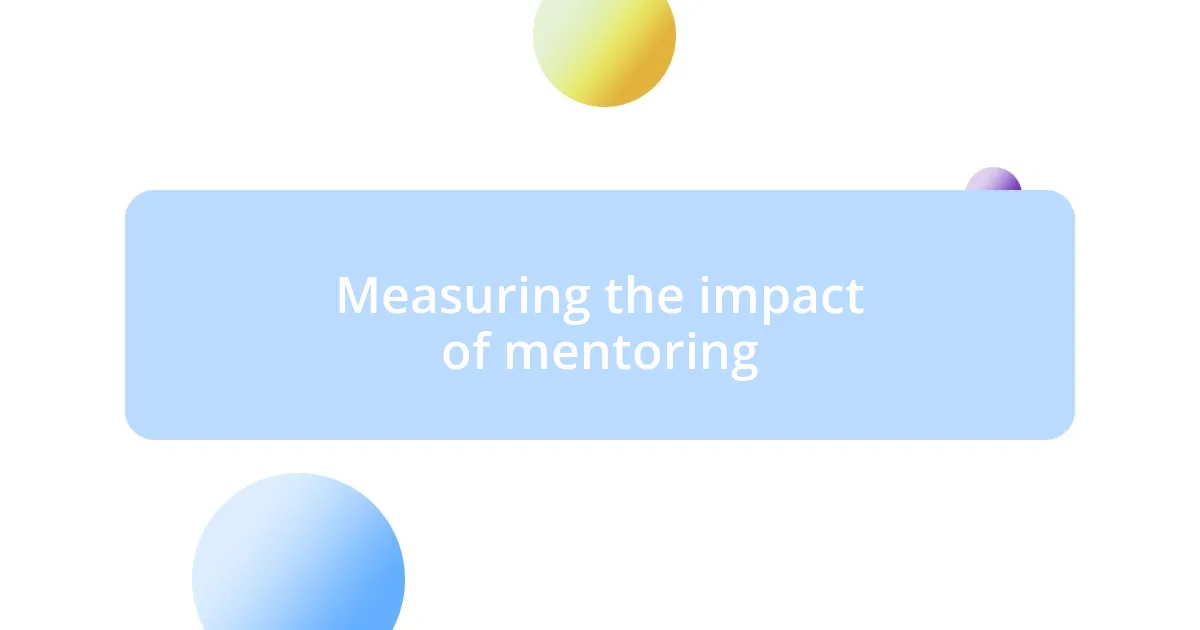
Measuring the impact of mentoring
Measuring the impact of mentoring can sometimes be tricky, but I’ve found that the metrics we use reveal much about the depth of a mentorship relationship. For instance, I like to track the progress of my mentees through their self-identified goals and accomplishments. Recently, one of my mentees shared an impressive project they completed, which we had outlined together just a few months earlier. Seeing their growth filled me with pride and highlighted just how effective our sessions had been.
In my experience, feedback is another vital tool for measurement. I often ask my mentees for their thoughts on our sessions—what worked and what didn’t. This transparency not only aids in refining my approach but also reinforces the idea that their voices matter in our dynamic. One time, a mentee mentioned they felt most inspired after discussing theoretical concepts, prompting me to integrate more of that into our future conversations. This two-way feedback loop cultivates an environment where both mentor and mentee flourish.
I also believe that impact can be measured by the emotional resonance of mentoring moments. Reflecting on a particularly enlightening session, I recall watching a mentee light up with confidence while brainstorming solutions to a challenge. Their joy was infectious, reminding me that the emotional highs we experience are significant indicators of our mentoring effectiveness. Have you noticed how these shared moments can transform the trajectory of both parties involved? It seems to me that when we connect emotionally, we’re not just mentoring; we’re creating lasting change.
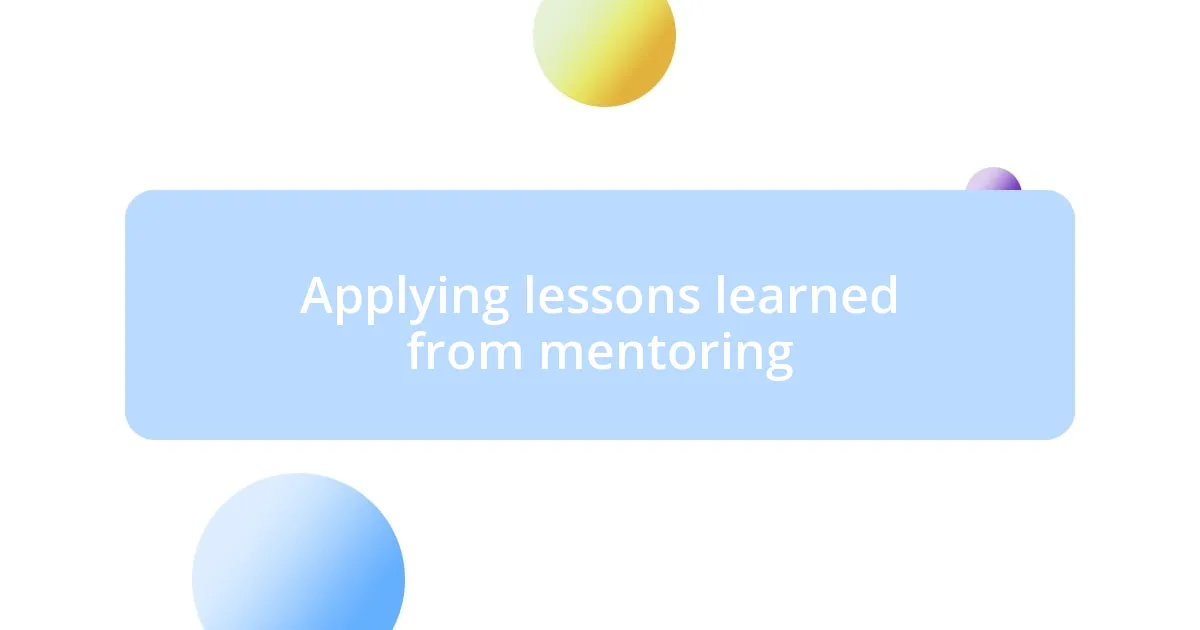
Applying lessons learned from mentoring
I find that applying lessons learned from mentoring often leads to unexpected personal growth. For example, after guiding a mentee through a difficult negotiation, I realized how much I too had improved in articulating my own needs. It struck me that the skills developed in mentorship play a reciprocal role; as I teach, I learn, and as my mentee gains confidence, so do I. Have you ever experienced that kind of mutual growth?
When it comes to problem-solving, I’ve noticed that mentoring prompts me to approach challenges more creatively. One time, I worked with a mentee who faced an obstacle in their project. My instinct was to dive into the solutions, but I paused instead, letting them brainstorm first. This shift in dynamics not only empowered them, but also encouraged me to reconsider how I tackle my own challenges. It was a powerful reminder that stepping back can be just as productive as taking the lead.
Additionally, mentoring has refined my communication skills significantly. I once guided a mentee who struggled with feedback, and it became a lesson for both of us. I learned the importance of framing criticism positively and highlighting strengths first. The resulting conversation not only inspired my mentee but also shifted how I express ideas in broader contexts. Have you reflected on how mentoring can reshape your communication style? I’ve found that every interaction enriches my understanding and strengthens my ability to connect with others on a fundamental level.












